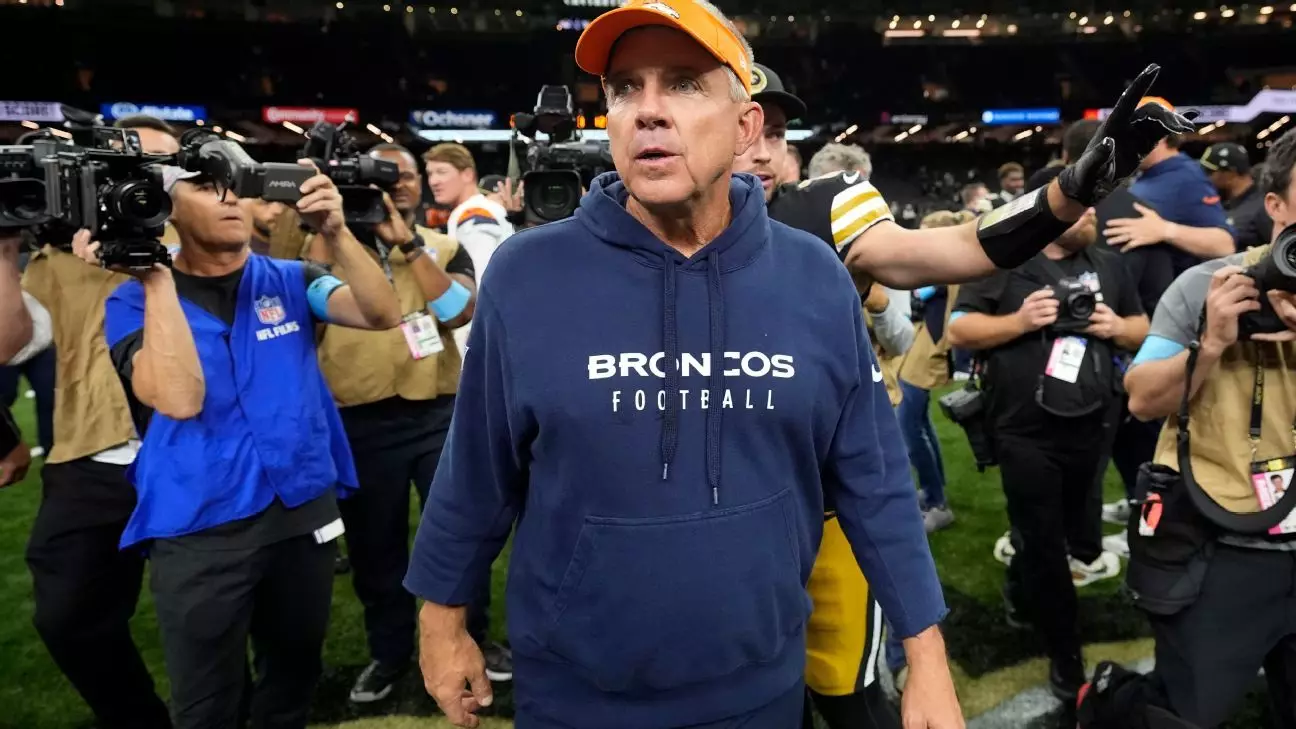The New Orleans Superdome, a venue that has witnessed countless unforgettable moments in NFL history, took on a unique sentiment one evening as the Denver Broncos took on the New Orleans Saints. The game held special meaning for Broncos head coach Sean Payton, who returned to the city where he had poured over a decade of his life as the head coach for the Saints. As an emotional backdrop, this game coincided with the celebration of Drew Brees, the legendary quarterback who led the Saints through a memorable era. Payton’s arrival hours before the game demonstrated the significance of the event to him, highlighting his reflective mindset as he prepared to face his former team.
Payton acknowledged the nostalgic weight of the evening by stating, “I’m glad I was here early.” Arriving six hours before kickoff allowed him to soak in the comfortable familiarity of New Orleans, a city that had shaped him both personally and professionally. The ambiance of the crowd had an undeniable energy, underscored by the tribute to Brees—now a cornerstone figure in Saints lore—who was honored during halftime. Witnessing the love and respect shown to Brees only deepened the connection Payton felt to the Saints organization and the city itself.
Despite the emotional undertow of the return, Payton was tasked with ensuring his team maintained its focus on executing a game plan to secure a crucial victory. The Broncos delivered a commanding performance, concluding the match with a convincing score of 33-10 over the Saints. With this win, the Broncos improved to a 4-3 record, marking their best start after seven games since 2016. Such statistics are not only important for the team’s morale but also reflect incremental progress in a franchise seeking identity and resurgence.
Payton’s past connection to the Saints served as both a motivator and a distraction. Nonetheless, players such as Mike McGlinchey encapsulated the success of the night, expressing pride in their ability to navigate the complexities and rise to the occasion. The strategic execution was illustrated by the Broncos’ formidable defense, which registered six sacks and even scored defensively. It felt as though Payton scripted a performance that both honored his roots and demonstrated the efficacy of his leadership in a new environment.
As the game unfolded, the buzz surrounding Drew Brees loomed large over the proceedings. Being acknowledged as the newest member of the Saints’ Hall of Fame, Brees drew a heartfelt response from the crowd, reflecting the deep connection he fostered with the New Orleans community. Brees had not only redefined the quarterback position in the city but also elevated the team’s status on a national scale. The Broncos, meanwhile, faced a Saints roster riddled with injuries, which dampened their overall effectiveness. Yet, it was not merely the physical limitations that dictated the game; Denver’s defense exerted its dominance and ensured that Brees’ former team struggled to find a rhythm.
Payton, who had once called the shots for Brees, witnessed the contrasting dynamics of coaching as he led the Broncos against his previous organization. The nostalgic contrast between fond memories and high-stakes competition illuminated the complexities of coaching—and the strategies employed to achieve victory against an adversary that was both familiar and steeped in personal history.
Remarking on the postgame emotions, Payton received the game ball, an emblem that honored both professional achievement and personal history. “It meant a lot,” Payton shared, revealing the bittersweet undertaking of navigating his past while forging his future. Being surrounded by old friends, former players, and connections from his time with the Saints underscored the often-overlooked communal aspect of professional football, emphasizing bonds built through shared experiences.
Jonathas from New Orleans encapsulated this essence by presenting the image of running back Tyler Badie in his youth, adorned in a Saints jersey, signaling the powerful heritage of the franchise. Such poignant moments demonstrate how sports can bridge generations, and for Payton, they serve as vivid reminders of both his legacy and the road ahead.
In the end, Sean Payton’s return to New Orleans stood as a testament to the intertwining of personal evolution, emotional resilience, and team commitment. It reinforced that while the past shapes us, it is the present achievements that pave the way towards future aspirations.


Leave a Reply